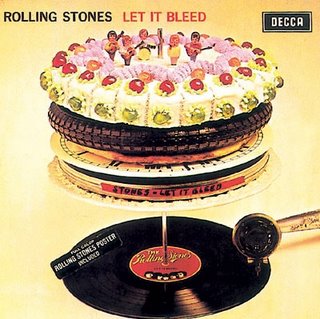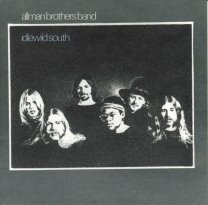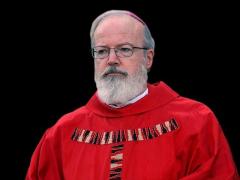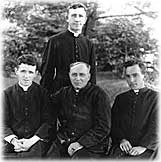 I know it isn’t the right attitude, but I have to admit that I’m somewhat bemused over this whole immigration flap.
I know it isn’t the right attitude, but I have to admit that I’m somewhat bemused over this whole immigration flap. A couple of caveats:
1) I recognize that
some kind of globalization is necessary. It is a scandal and a sin that most of the people in the world live on less than a couple of dollars a day. We all need to help to lift them out of that poverty, but it shouldn’t be done the way it is being done now, with the weakest and most vulnerable being forced into a race to the bottom so that a relative few can live in 4,000 square foot houses.
2) I am in favor of legal immigration. It has always been the nation’s life-blood. We should welcome the stranger. For those who are already here illegally, I think that we need to do something to normalize their status. For those who have not arrived yet, but are sure to do so, I honestly don’t know what can be done. I bear no animosity towards anyone for their race, color, ethnicity, or national origin, although I am not above joking or wisecracking about them, just as I would regarding people of my own ethnicity. We all need to be able to laugh at ourselves.
For years I have been railing on and on to anyone who would listen about outsourcing and offshoring. I live less than 20 miles from where I work, and I work with foreigners all day, onshore and offshore. Very nice fellows for the most part. Skilled and hard-working. I see and interact more with foreigners every day than I do with my own friends and neighbors.
Not one of them is the slightest bit interested in being an American.
The company I work for is sending work overseas as fast as it possibly can, and the scope of work that is being done offshore is climbing higher and higher up the skill chain. The company eyes my position like a hungry hawk, waiting for the day that I have finally dug my own grave deep enough so that they can throw me into it and replace me with someone offhsore…. While there’s a
war on. I’ve seen guys in their 40’s and 50’s pushed out this way, and I’ve seen them fall into a sort of abyss. It is a constant challenge to stay educated, keep moving and find ways to “add value”. Most of this lament falls on deaf ears. If you go on about this, you’re considered a baby. A protectionist. A socialist. An “economic girlie-man”. I hear:
“That’s just the free market. It works better for everyone in the long term”.
“Stop your whining… You work for a Fortune 500 company, live in a nice suburb, and own two SUV’s. What’s going to happen to you? Nothing.”.
And so on… I’ve largely come to terms with it over the last few years. I know that I probably couldn’t survive a learned economic debate over it. I suppose it just doesn’t resonate with people until it comes to the day that it threatens their own jobs. I admit that I never really cared when it affected auto and textile workers.
What I am describing happens at the corporate level with the closest cooperation with the government. It enjoys this administration’s heartiest encouragement. The Democrats are hardly any different. As far as I’m concerned, illegal immigration is the same syndrome, also coming from that level, but coming up as a groundswell from the bottom as well.
There is only one reason why most illegal immigrants are here. It is because people want to hire them. If you want to “blame” anyone, don’t blame the illegal immigrant. He's just trying to make a living. If there is anyone to blame at all, the blame lies on the rest of us.This country has an insatiable, voracious appetite for cheap, disposable labor (it has in the past, and would in the future, try to get way with free labor if it could). Conversely, it has no tolerance for inflation. From the boardrooms of the biggest corporations, to the smallest of businesses, to the kitchens of the suburban wife, it is the same need.
Of all the folks who call talk-radio screaming about illegal immigration, I wonder how many of them:
- Eat meat and chicken processed by Tyson, where the slaughterhouses and meat-packing plants are staffed by illegal Mexican immigrants.
- Eat fruit picked by illegal Guatemalan immigrants.
- Hire "Mike’s Landscaping service", with the crews made of illegals from El Salvador.
- Hire "Pat’s Painting", with painters here illegally from Panama.
- Hire "Bob’s Construction", with plasterers here illegally from Ireland.
- Hire undocumented nannies from Sweden or the Dominican Republic.
- Hire undocumented cleaning ladies from Brazil.
Globalization cheerleaders like Tom Friedman are always telling us now that the world is flat, and that we need to be ready to compete globally in this new economy. It makes you wonder in the long run what the benefits of citizenship will be. If the corporations aren't watching our backs, and the government isn't watching our backs, is anyone? National borders are taking on less significance and are gradually disappearing. Well, if the laws are being changed so that capital and corporations can easily flow across national borders, why are we surprised when workers take it upon their initiative to do the same thing?
Yes, we have lost control over our own borders, which is a very dangerous thing in a time of war, but under the prevailing philosophy in which we run our economy, it was entirely predictable and inevitable. What did people expect?
Next, how I became a member of the "overclass".



















